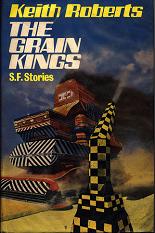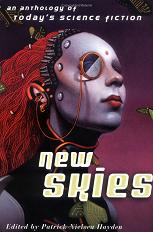
The Grain Kings
Keith Roberts
208 pages
published in 1976
Nothing says seventies science fiction as much as a Fossian cover like this, slapped by Panther and Pan on every book they published regardless of contents. Big, blocky machinery, preferably some sort of spaceship, with brigh colours and no human figures: that’s science fiction and you don’t need anything more. For once, the cover is even justified, showing one of the huge grain combine harvesters from the title story of this collection. Course, you’ll still be disappointed if you get this expecting the sort of cool, clinical, techno-driven stories the cover suggests; Keith Roberts isn’t that kind of writer.
Keith Roberts debuted as a writer in 1964 in New Worlds, involved with, but not a part of, the New Wave. Partially this was due to his personality as he allegedly was quite a difficult character to work with, getting into fights with his editors and publishers. But it was also because he was less interested in the two main obsessions of the New Wave, death & entropy and sex & taboos. Nevertheless if you like Brian Aldiss or Christoper Priest changes are you’ll like Roberts as well. Roberts was more than just a writer; during the sixties he worked both as an editor for the British magazine Science Fantasy/SF Impulse, as well as its artistic director, designing most of the covers for it, as well as for several issues of New Worlds. A shame he didn’t get the chance to design the cover of this book, as the impressionist look he used in his own designs would’ve been much more suited for it. Keith Roberts has always been somewhat of a cult author, best known for his second novel Pavane, a classic alternative history story and one out of two of his books still in print today (the other one is The Furies).

